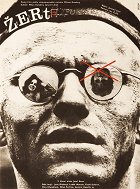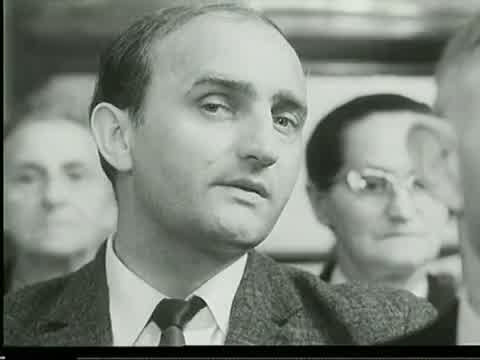Rendező:
Jaromil JirešOperatőr:
Jan ČuříkZeneszerző:
Zdeněk PololáníkSzereplők:
Josef Somr, Jana Dítětová, Luděk Munzar, Jaroslava Obermaierová, Milan Švrčina, Miloš Rejchrt, Evald Schorm, Věra Křesadlová, Jaromír Hanzlík (több)Tartalmak(1)
Ludvík Jahn returns to his native city after many years to meet the radio reporter Helena Zemánková, who plans to broadcast a story on a local traditional folk festival, Ludvík wants to have his revenge. Helena has no idea that Ludvík's interest in the meeting is not caused by her withering appeal but her husband's photograph which Ludvík spotted in her cigarette case. Fifteen years ago, Pavel Zemánek was Ludvík's faculty colleague, chairman of the faculty organization of the Communist Party of Czechoslovakia and also his best friend. At that time, Ludvík's colleague and love Markéta sent him from her training a letter full of swollen optimism and phrases. He sent her a reply on a postcard and closed his ironical message with the greeting "Long Live Trotsky!" His practical jokes, however, were not appreciated and, thanks to Pavel, Ludvík was expelled both from the party and the school and sent to military service with the so-called "Black Barons," Auxiliary Technical Battalions, then to military prison and finally for three year's work in the mines. Ludvík wants to have his revenge on the hated Pavel by seducing his wife. In a lent flat, Ludvík not too affectionately takes Helena into his power. When he learns that the Zemáneks marriage has been solely formal for many years already, he rejects the woman's infatuated chattering with contempt. Helena tries to commit suicide - which is as ridiculous and misshapen as Ludvík's desired revenge... (forgalmazó hivatalos szövege)
(több)Recenziók (5)
Like the book on which it is based, the film version of The Joke is worthy of the Kundera name. The author collaborated on the screenplay, which was written before the book was published (though not before the book itself was written), thanks to which Jireš’s film works as a coherent bitter comedy independent of the book. The film is not harmed by the most significant change compared to the book, namely the distillation of the book’s multiple narrators into one – instead of specific language, the others are presented to us through the appropriate speech of the actors (Kostka’s brief chapters full of religious motifs are fully compensated for by the several-minute appearance of Evald Schorm, the moral authority of the New Wave). The determination in Josef Somr's otherwise sadly vacant gaze multiplies the tragicomic nature of Ludvík’s actions. Whatever he does, he ends up hurting himself or someone else. Would it be better if he did nothing? The flashbacks, in which we see others through Ludvík’s eyes and the characters speak directly to us (resulting in an actual dialogue with a past era), serve as ironic commentary on the present: the initiation of young children as new citizens x the treacherous beasts that they will most likely grow up to be; traditional folk music x hard work in the mines. Irrational laughter is offered as the only reasonable solution. Like Kundera the author, Kundera the screenwriter warns against forgetting the past without sliding into moralistic preaching. Besides Ludvík, who is frozen in the past like the eggnog at the end of Passer’s Intimate Lighting, most of the characters behave as though there was no “then”. The impossibility of determining what is better gives rise to an intense, long-lasting feeling of futility. 80%
()
Rather a failed adaptation, the quality of which does not change by the fact that Milan Kundera is signed under the script. The first part is definitely an excellent idea, where the whole of Ludvík’s disciplinary proceedings are carried out from a first-person perspective and relates to an aged Ludvík who has come for revenge. The rather fundamental problem is that the complexity of the book template could not be transferred to the film, so the whole story is reduced to a tale of cynical revenge of a humiliated cold-blooded nihilist. Logically, not only Ludvík's unfortunate attempt to find himself behind the eternal cycle of masks disappeared, but also a lot of wonderful moments from the book (the episode with Lucia). Even the condemnation of ideology is much more straightforward and simpler than the attitude Kundera took in the book. Realizing shared guilt about the state of the world and at the same time helplessness in the face of history is one of the powerful qualities of the book, but it is missing from the film (drastically, Ludvík's joke is that, from a certain point of view, everything he is condemned to do is really true). I guess it had to be that way.
()
Joke, that is primarily an exceptional literary substance, one of Milan Kundera's best works and at the same time one of the best novels about the atmosphere of the 50s in our country. A bitter narrative about how history can crush individuals, and about the fact that revenge does not have to taste sweet and carry bitterness within oneself means unnecessarily depriving oneself of a lot of pleasant things. It is a burden that marks everyone. One of Josef Somr's crucial roles tailored to his acting. Overall impression: 90%.
()
From the works of the problematic years of Czechoslovak cinema (sometimes considered the works of the Czechoslovak miracle), I rarely got the feeling that my time was not wasted and that it wasn’t a torturous experience. Some of the results of Jaromil Jireš prove this. I find myself cautiously appreciating The Joke. That wouldn't be the case if I hadn't enjoyed Tomorrow, People Will Be Dancing Everywhere so fully, given the fact that without seeing those exalted national dances in action, this would feel like nothing. The caricatures of Munzar and Křesadlová bring The Joke down to earth, Schrom is defenseless in his acting as a child, and Dítětová makes me shudder, but I can single out Somr above all hesitations.
()
I've never read anything by Kundera, but from what I've read of him, the hero here, in his insufferability, arrogance, and bitterness, is pretty true to how I've always imagined him. Personally, what struck me most was the motif of the aging constructivist youth who even when witnessing a critical revision of socialist values in the 60s has tied their memories of youth to the monstrous celebrations, marches, and optimistic songs about reconstruction and the new era. As for Ludvík himself, he should have remembered the nationalist saying "If you want to dance with Švorcová, don’t be surprised when the gulag comes."
()

